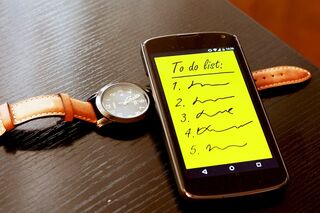Procrastination
How to Get More Done
Here are a few ideas for efficiency as well as avoiding procrastination.
Posted February 8, 2021

Getting things done feels good: You’re being responsible and more effectively negotiating life. Plus it feels good to cross something off your to-do list, far better than feeling guilty about all that you should have done. Another plus: Staying busy distracts you from malaise that you can’t fix, at least for now.
If you’d like to get more done, perhaps one or more of these will help:
Make it non-negotiable. If you allow yourself the choice of whether or not to do a necessary task, you’ll too often opt not to. Should you make the items on your to-do list non-negotiable?
Make it more pleasant. I’m not just talking about listening to music while working. For example, might you actually enjoy gameifying, thinking, “What’s the most time-effective way: Should I do that task as fast as I can, or do it deliberately?” For example, maybe you want to keep refining your morning routine to yield the most benefit for the least time. Or figure out how to make meal preparation easier yet still healthy, affordable, and tasty — I plan to soon post "One-Minute Cuisine." Thinking of time-effective approaches to tasks can be fun. At least I find it fun, well, sort-of fun.
Here are other examples of what I do to be time-effective. Perhaps they’ll trigger ideas that will work for you.
I have my new clients complete and email me a probing questionnaire in advance of our first session. That way, instead of having to spend a session or two on those questions and the client having to come up with thoughtful answers on-the-spot, s/he can reflect on the questions and not have to pay for the time. Plus we can make progress more quickly.
I quickly turn to Google-search: whether to find something for a client, address a computer problem, or how to fix my running toilet. When I realize (usually quickly) that I’m unlikely to fix said toilet, I jump to Yelp to find someone local with mainly five-star reviews.
I’m conscious of my breaks' length. Whenever I feel I need a break, I decide whether a microbreak will do, like one deep breath and/or pet my dog, a minibreak for five minutes to do something physical like vacuum, a full break like a 45-minute hike, or a few-hour relaxation at the end of the day. For example, my wife and I enjoy watching movies in our “cocoon.” Our favorite of recent years: Parasite.
As a parent, I was careful not to over-parent, not just for efficiency, but because a hovering, helicopter parent can impede a child’s self-efficacy and increase their sense of entitlement.
I’ve avoided major time sucks: playing golf, getting addicted to video games or watching sports. But we're not extreme about it. For example, today, our plan is to turn on the TV for the Super Bowl's last quarter. If it's close, we'll watch and if it's a blowout, we'll watch another episode of All Things Great and Small.
I use a simple, yet effective calendaring and to-do system. Time-prescribed tasks like client sessions go on a week-at-a-glance paper calendar. Here’s my current one. I put my other to-dos on a memo cube. If a task takes less than a minute or two, for example, something to look up on the internet, to avoid my list getting dauntingly long, I’ll usually just do it.
Multitasking isn't all bad. For example, I often will weed or dust while working with a remote client. Not only do I feel I can pay full attention to the client, I’m actually more alert when moving around a little than if just sitting there. Another example: I make phone calls when driving and always have an audiobook on my phone for when I’m walking, waiting in-line, or driving. (Bluetooth connects to my car’s speakers.) Usually, I listen to something that would benefit my career counseling, for example, a biography (I’m currently listening to Robin, Robin Williams’ biography) but sometimes it's a novel, just for fun. My favorite in recent years is All the Light We Cannot See. I often bring a problem to think about when in the shower — that's undistracted time. My favorite multitasking is when my dog Hachi and I hike to Trader Joe's: We get our exercise, he gets on empty, I get my shopping done, and I have quality time to think about my next client, what to write, etc.
A failing of many how-to writers is to assume that the reader is as motivated as the writer to follow his or her advice. I want to be more humble: Is there even one idea among the aforementioned that you'd like to try?
I expand on this topic on YouTube.


